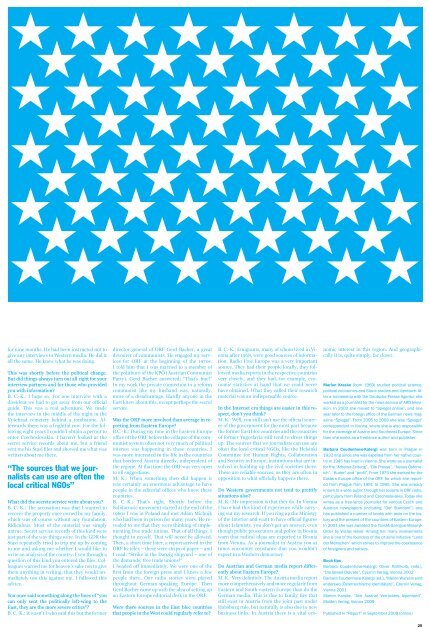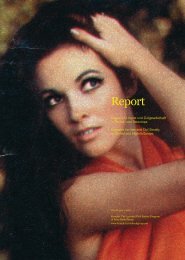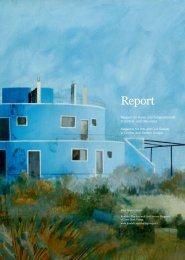Report_Issue 1/2009 - Jubiläum/ 20 Jahre Mauerfall
Report_Issue 1/2009 - Jubiläum/ 20 Jahre Mauerfall
Report_Issue 1/2009 - Jubiläum/ 20 Jahre Mauerfall
Erfolgreiche ePaper selbst erstellen
Machen Sie aus Ihren PDF Publikationen ein blätterbares Flipbook mit unserer einzigartigen Google optimierten e-Paper Software.
for nine months. He had been instructed not to<br />
give any interviews to Western media. He did it<br />
all the same. He knew what he was doing.<br />
This was shortly before the political change.<br />
But did things always turn out all right for your<br />
interview partners and for those who provided<br />
you with information?<br />
B. C.-K.: I hope so. For one interview with a<br />
dissident we had to get away from our official<br />
guide. This was a real adventure. We made<br />
the interview in the middle of the night in the<br />
Vyšehrad cemetery behind a tombstone. Afterwards<br />
there was a frightful row. For the following<br />
eight years I couldn’t obtain a permit to<br />
enter Czechoslovakia. I haven’t looked at the<br />
secret service records about me, but a friend<br />
sent me his Stasi files and showed me what was<br />
written about me there.<br />
“The sources that we journalists<br />
can use are often the<br />
local critical NGOs”<br />
What did the secrete service write about you?<br />
B. C.-K.: The accusation was that I wanted to<br />
recover the property once owned by my family,<br />
which was of course without any foundation.<br />
Ridiculous. Most of the material was simply<br />
untrue. Secret service records of this kind were<br />
just part of the way things were. In the GDR the<br />
Stasi repeatedly tried to trip me up by coming<br />
to me and asking me whether I would like to<br />
write an analysis of the country. Even through a<br />
question of this kind you entered the files. Colleagues<br />
warned me for heaven’s sake not to give<br />
them anything in writing, that they would immediately<br />
use this against me. I followed this<br />
advice.<br />
You once said something along the lines of “you<br />
can only sent the politically left-wing to the<br />
East, they are the more severe critics“?<br />
B. C.-K.: It wasn’t I who said this but the former<br />
director general of ORF Gerd Bacher, a great<br />
devourer of communists. He engaged my services<br />
for ORF at the beginning of the 1970s.<br />
I told him that I was married to a member of<br />
the politburo of the KPÖ (Austrian Communist<br />
Party). Gerd Bacher answered: “That’s fine!”<br />
In my work the private connection to a reform<br />
communist like my husband was, naturally,<br />
more of a disadvantage. Hardly anyone in the<br />
East knew about this, except perhaps the secret<br />
service.<br />
Was the ORF more involved than average in reporting<br />
from Eastern Europe?<br />
B.C.-K.: During my time in the Eastern Europe<br />
office of the ORF before the collapse of the communist<br />
system often not very much of political<br />
interest was happening in these countries. I<br />
was more interested in the life in the countries<br />
that bordered Austria directly, independent of<br />
the regime. At that time the ORF was very open<br />
to all suggestions.<br />
M. K.: When something then did happen it<br />
was certainly an enormous advantage to have<br />
people in the editorial offices who knew these<br />
countries.<br />
B. C.-K.: That’s right. Shortly before the<br />
Solidarność movement started at the end of the<br />
1960s I was in Poland and met Adam Michnik<br />
who had been in prison for many years. He revealed<br />
to me that they were thinking of implementing<br />
free trade unions. That of all things, I<br />
thought to myself. That will never be allowed.<br />
Then, a short time later, a report arrived in the<br />
ORF by telex – these were strips of paper – and<br />
I read: “Strike in the Danzig shipyard – one of<br />
the demands: free trade unions!“<br />
I headed off immediately. We were one of the<br />
first from the foreign press and I knew a few<br />
people there. Our radio stories were played<br />
throughout German-speaking Europe. Then<br />
Gerd Bacher came up with the idea of setting up<br />
an Eastern Europe editorial desk in the ORF.<br />
Were there sources in the East bloc countries<br />
that people in the West could regularly refer to?<br />
B. C.-K.: Emigrants, many of whom lived in Vienna<br />
after 1968, were good sources of information.<br />
Radio Free Europe was a very important<br />
source. They had their people locally, they followed<br />
media reports in the respective countries<br />
very closely, and they had, for example, economic<br />
statistics at hand that we could never<br />
have obtained. What they called their research<br />
material was an indispensable source.<br />
In the Internet era things are easier in this respect,<br />
don’t you think?<br />
M. K.: Well, you still can’t use the official sources<br />
of the government for the most part because<br />
the former East bloc countries and the countries<br />
of former Yugoslavia still tend to dress things<br />
up. The sources that we journalists can use are<br />
often the local critical NGOs, like the Helsinki<br />
Committee for Human Rights, Collaboration<br />
and Security in Europe, institutions that are involved<br />
in building up the civil societies there.<br />
These are reliable sources, as they are often in<br />
opposition to what officially happens there.<br />
Do Western governments not tend to prettify<br />
situations also?<br />
M. K.: My impression is that they do. In Vienna<br />
I have had this kind of experience while carrying<br />
out my research. If you ring up the Ministry<br />
of the Interior and want to have official figures<br />
about Islamists, you don’t get an answer, even<br />
though public prosecutors and police in Bosnia<br />
warn that radical ideas are exported to Bosnia<br />
from Vienna. As a journalist in Austria you at<br />
times encounter resistance that you wouldn’t<br />
expect in a Western democracy.<br />
Do Austrian and German media report differently<br />
about Eastern Europe?<br />
M. K.: Very definitely. The Austria media report<br />
more comprehensively and more regularly from<br />
Eastern and South-eastern Europe than do the<br />
German media. This is due to family ties that<br />
still exist in Austria from the joint past under<br />
Habsburg rule, but naturally is also due to new<br />
business links. In Austria there is a vital eco-<br />
nomic interest in this region. And geographically<br />
it is, quite simply, far closer.<br />
Marion Kraske (born 1969) studied political science,<br />
political economics and Slavic studies and literature. After<br />
a traineeship with the Deutsche Presse Agentur she<br />
worked as a journalist for the news service of ARD television.<br />
In <strong>20</strong>02 she moved to “Spiegel online”, and one<br />
year later to the foreign office of the German news magazine<br />
“Spiegel”. From <strong>20</strong>05 to <strong>20</strong>08 she was “Spiegel”<br />
correspondent in Vienna, where she is also responsible<br />
for the coverage of Austria and Southeast Europe. Since<br />
then she works as a freelance author and publisher.<br />
Barbara Coudenhove-Kalergi was born in Prague in<br />
1932 and since she was expelled from her native country<br />
in 1945 has lived in Vienna. She wrote as a journalist<br />
for the “Arbeiter-Zeitung”, “Die Presse”, “Neues Österreich”,<br />
“Kurier” and “profil”. From 1975 she worked for the<br />
Eastern Europe office of the ORF, for which she reported<br />
from Prague from 1991 to 1995. She was already<br />
known to a wide public through her reports in ORF radio,<br />
particularly from Poland and Czechoslovakia. Today she<br />
writes as a free-lance journalist for various Czech and<br />
Austrian newspapers (including “Der Standard”) and<br />
has published a number of books with texts on the history<br />
and the present of the countries of Eastern Europe.<br />
In <strong>20</strong>01 she was awarded the Tomáš-Garrigue-Masaryk<br />
Order by Vaclav Havel. Among her many involvements<br />
she is one of the founders of the citizens initiative “Land<br />
der Menschen” which strives to improve the coexistence<br />
of foreigners and natives.<br />
Book tips<br />
Barbara Coudenhove-Kalergi, Oliver Rathkolb, (eds.),<br />
“Die Beneš-Dekrete”, Czernin Verlag, Vienna <strong>20</strong>02<br />
Barbara Coudenhove-Kalergi (ed.), “Meine Wurzeln sind<br />
anderswo (Österreichische Identitäten)”, Czernin Verlag,<br />
Vienna <strong>20</strong>01<br />
Marion Kraske, “Ach Austria! Verrücktes Alpenland”,<br />
Molden Verlag, Vienna <strong><strong>20</strong>09</strong><br />
Published in “<strong>Report</strong>” in September <strong>20</strong>08 (online)<br />
25




